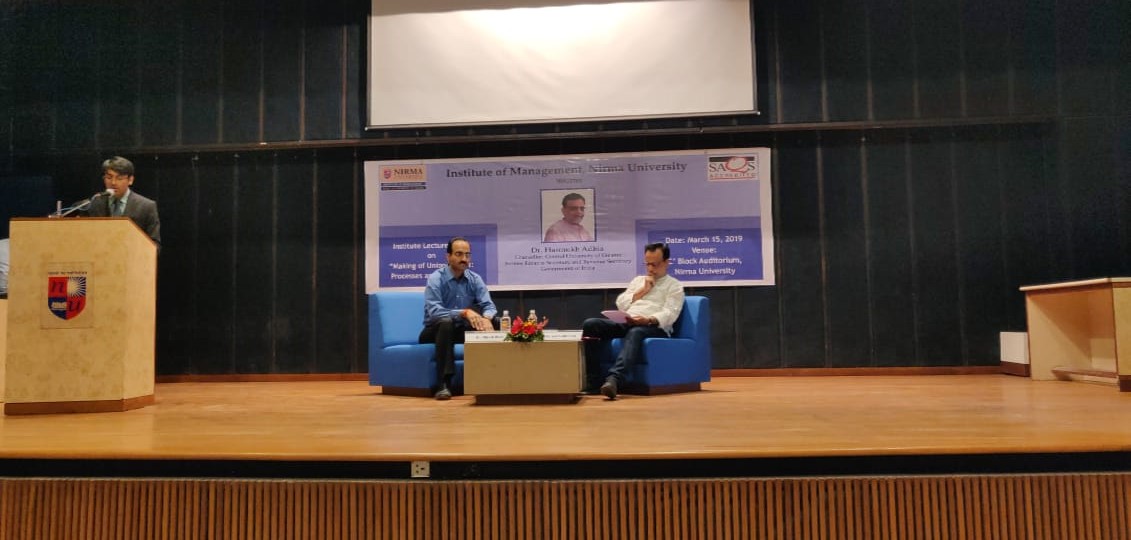
The Institute of Management, Nirma University (IMNU) hosted an enlightening session on 15th March 2019 as part of its Lecture Series. The guest speaker, Dr. Hasmukh Adhia, Chancellor of the Central University of Gujarat and former Finance Secretary and Revenue Secretary of India, shared valuable insights on the Making of Union Budget.
Understanding the Importance of the Budget Speech
Dr. Adhia began his talk by emphasizing how important it is to listen carefully to the Finance Minister’s Budget Speech. The speech is not only about financial figures but also reflects the state of the Indian economy, government policies, and the country’s fiscal direction.
He explained that a budget is essentially an estimate of the receipts and expenditure of the Union Government of India.
Constitutional Provisions and Expenditures
Dr. Adhia discussed various constitutional provisions related to the Union and State Budgets. He highlighted Article 112, which mandates the government to present financial statements and accounts before the Lok Sabha.
He explained the two types of expenditures:
-
Voted Expenditures – approved by the Parliament annually.
-
Charged Expenditures – include the salaries and expenses of the President, Vice President, Speaker of Lok Sabha, Judiciary, and government loans or advances.
Government Funds and Their Purpose
Dr. Adhia elaborated on the three major government funds:
-
Consolidated Fund of India
-
Public Account of India
-
Contingency Fund of India
These funds help the government manage its inflows and outflows effectively. The treasury collects and reinvests funds across different sectors of the economy.
Bills and Budget-Making Process
The discussion then moved to the bills that form the annual budget, such as:
-
Appropriation Bill – which contains the Demands for Grants by all ministries.
-
Finance Bill – which includes tax proposals and financial measures.
Dr. Adhia also explained Money Bills and the special provisions under Articles 109, 110, and 112 of the Constitution that govern their introduction and passage.
Vote on Account and the Role of Finance Ministry
Dr. Adhia introduced the concept of Vote on Account, an interim measure used before the final Finance Bill is passed. He detailed the five departments under the Finance Ministry and described how each contributes to the budget-making process.
He also offered an overview of the structure of the Finance Ministry and the steps involved in preparing and approving the Union Budget.
Traditions and Public Communication
Dr. Adhia shared the story of the century-old ‘Halwa Ceremony’, a symbolic tradition honoring staff who work in secrecy to prepare and print budget documents.
He explained how media arrangements are made to ensure quick dissemination of budget details, helping the public understand complex documents. Drawing from his own experiences, Dr. Adhia described the sequence of events on Budget Day, concluding with the press conference held after the presentation.
Interactive Q&A Session
The session ended with an engaging question-and-answer round, where Dr. Adhia addressed queries from students and faculty, providing deeper insights into the Union Budget process.
About Institute of Management, Nirma University
‘The Institute of Management’ is a constituent of the distinguished Nirma University of Science and Technology, Ahmedabad. The Institute was established in 1996 with a view to promote excellence in management education and to prepare young men & women to meet the challenges of the developing corporate world. It has been A+ status in rankings published by Business Standard. The flagship programme offered by the institute is the residential 2 years MBA program. It also offers MBA (Family Business and Entrepreneurship), MBA (Part-time), Doctoral programmes, Executive and Management development programmes. IMNU has also started a 5 year integrated BBA program. The college has tie-ups with institutes in USA, Australia, South Africa, South Korea, Taiwan and Malaysia.
Institute of Management, Nirma University
